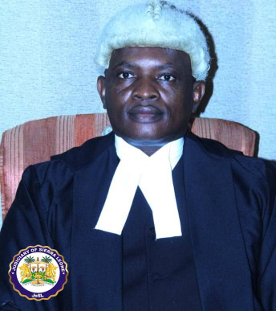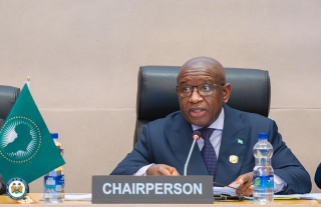Justice Reginald Fynn Criticizes Process Behind Justice Halloway Suspension

By Kelvin Jay
Court of Appeals Judge, Reginald Sydney Fynn, has addressed a strongly worded letter to President Julius Maada Bio, expressing his dissent regarding the decision taken at the Judicial and Legal Service Commission meeting of 5th September 2025, which led to the suspension of Justice Alan Halloway.
Citing both constitutional safeguards and principles of natural justice, Justice Fynn outlined the following key reservations:
1. Lack of Clear Charges
• The Commission did not present a clear statement of the alleged misconduct against Justice Halloway.
• Instead, members were given a collection of old newspaper reports, letters, and documents dated between 2010–2013, alongside three recent letters exchanged between Justice Halloway and the Hon. Chief Justice.
• Justice Fynn stressed that he remains uncertain about the specific allegations forming the basis of the referral. He noted that reliance on past conduct as proof of present accusations is generally unsafe and prejudicial.
2. Violation of Natural Justice
• The Hon. Chief Justice acted simultaneously as complainant and Chairman of the meeting, a situation Justice Fynn described as fundamentally flawed, since no one should be “judge and jury in his own cause.”
• Justice Halloway was never informed that his conduct was under scrutiny nor afforded an opportunity to present his side of the story. Justice Fynn emphasized that the most basic safeguard of natural justice — audi alteram partem (“hear the other side”) — was not observed.
3. Gravity of Judicial Removal
• The removal of a judge is the ultimate penalty for misconduct under the Constitution (Section 137 (4)–(7)).
• Such a measure, he argued, must be reserved for the gravest cases, supported by clear prima facie evidence and reached through due process.
4. Procedural Irregularities
• Members of the Commission were not given prior notice of the agenda or supporting documents. Justice Fynn noted that he, and likely others, came to the meeting unprepared to deliberate such a serious matter.
• The meeting itself was characterized by “anger, wild accusations of the gravest kind, and complete intolerance for any contrary view.” His attempt to record his dissent was refused, though he was told he could write directly to State House.
5. Appearance of Reprisal
• One of the documents before the Commission was a letter from Justice Halloway alleging constitutional violations by the Hon. Chief Justice. Justice Fynn observed that instead of addressing those allegations, the Commission appeared to respond with measures that looked like retaliation.
• He suggested that the issues between the Hon. Chief Justice and Justice Halloway could have been more appropriately resolved by the Supreme Court in full coram.
6. Risk of Prejudicing the Tribunal.
While it may be argued that the intended tribunal will hear all sides, Justice Fynn cautioned that once the foundations of fairness are compromised, “an ominous shadow” is cast over the entire process.
In closing, Justice Fynn stated that his dissent was made pursuant to his constitutional duties (Section 140(1)) and with the aim of strengthening judicial independence, ensuring fairness, and protecting the rule of law. He expressed hope that dissent within the judiciary would be respected, not dismissed as distraction, and that the “Fountain of Justice” should only endorse practices that uphold fairness and due process.





